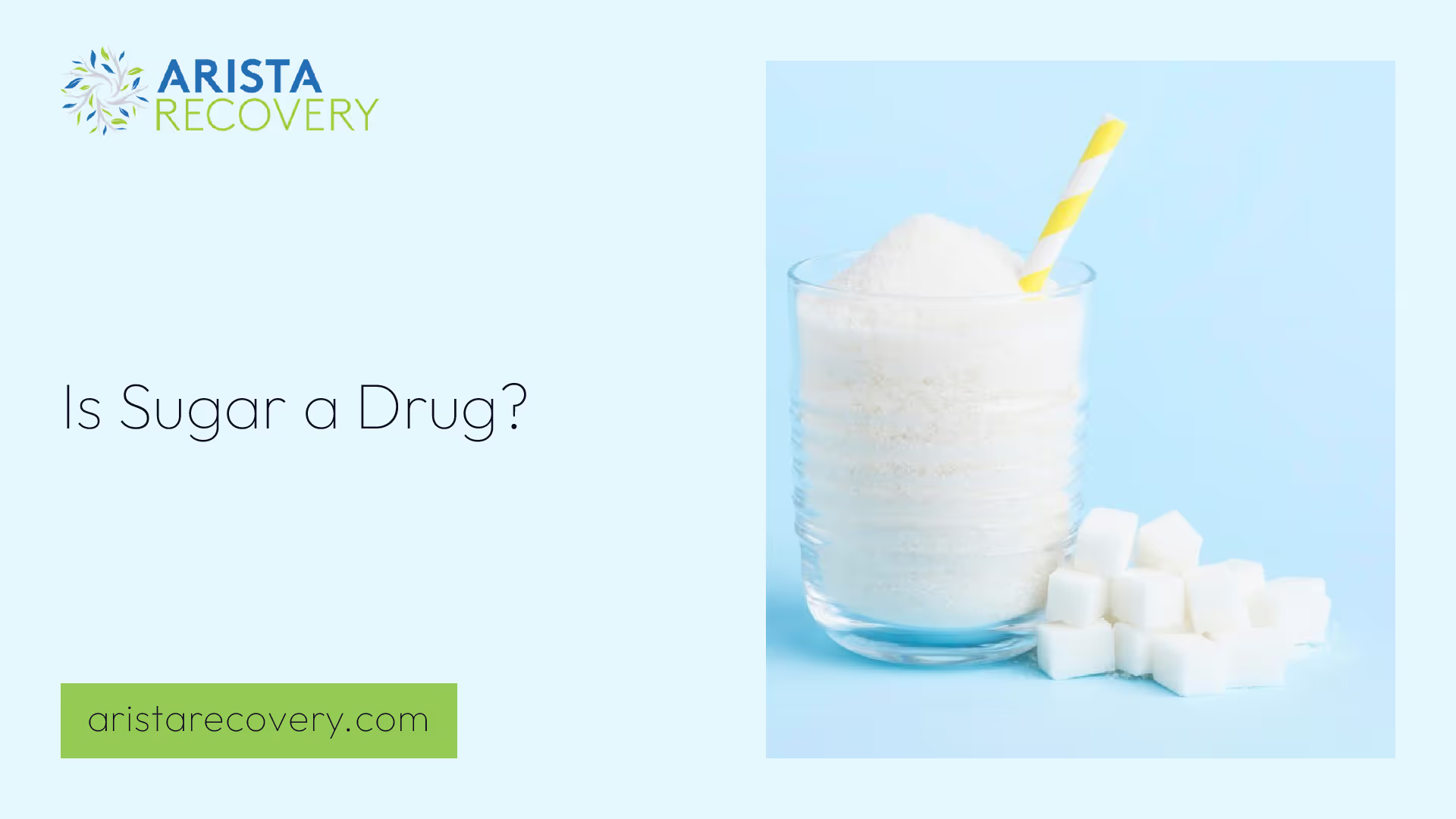Is Sugar a Drug?

Understanding Sugar Addiction
Getting to the heart of the question "is sugar addictive" involves delving into both the definition of sugar addiction and understanding how sugar impacts the brain.

Sugar addiction refers to a biological and psychological dependence on sugar, characterized by intense cravings, tolerance, and withdrawal symptoms when reducing or eliminating sugar intake. The idea that sugar may be addictive has gained traction in recent years, with some researchers suggesting that it has similarities to drug addiction in the way it affects the brain. However, the scientific evidence supporting this claim is still unclear and remains a topic of ongoing research [1].
Rats with intermittent access to sugar exhibit behaviors similar to drug addiction, including bingeing, withdrawal, and craving for sugar. Changes in the brain, such as alterations in dopamine and opioid receptor binding, support the hypothesis that rats can become sugar dependent. The translation of these findings to human conditions related to eating disorders and obesity is an area of active investigation [2].
Sugar Impact on the Brain
Consuming sugar activates the same brain regions that are involved in addiction to substances like cocaine and alcohol. This can lead to increased cravings and contribute to addictive-like behavior [3].
In specific, sugar triggers the release of dopamine in the brain, a neurotransmitter associated with pleasure and reward. This dopamine release reinforces the desire to consume more sugar, creating a cycle of consumption and craving. Sugar stimulates the brain much like drugs such as cocaine and heroin, triggering the release of these feel-good chemicals [1].
In conclusion, while the addictive potential of sugar is a subject of ongoing scientific debate, evidence suggests that sugar consumption can lead to behavioral and neurological responses associated with addiction. Understanding this impact of sugar on the brain is a crucial step in addressing questions about sugar addiction and developing strategies to manage sugar consumption.
Sugar and Dopamine
In order to answer the question, "is sugar addictive?", it's crucial to understand the role dopamine plays in addiction, and how sugar impacts dopamine release.
Role of Dopamine in Addiction
Dopamine is a neurotransmitter associated with pleasure and reward in the brain. It is released when we engage in activities that are pleasurable, and this release reinforces the desire to repeat these activities. Dopamine plays a significant role in addiction, as addictive substances stimulate the brain to release dopamine, creating a feeling of pleasure and reward. This is what can drive people to continue seeking out and using these substances, despite negative consequences.
Sugar's Effect on Dopamine Release
Sugar, in particular, activates the release of dopamine in the brain. This process is similar to the effect of drugs like cocaine and heroin, which also trigger the release of dopamine and other feel-good chemicals. The pleasure derived from the dopamine release reinforces the desire to consume more sugar, contributing to addictive-like behavior.
Research has shown that intermittent sugar access in rats results in behaviors reminiscent of drug addiction, such as bingeing, withdrawal, and craving for sugar. Sugar releases opioids and dopamine, indicating its potential for addiction. The changes observed in dopamine and opioid receptor binding in the brains of rats support the hypothesis that sugar dependency can develop in these animals, which may translate to human conditions related to eating disorders and obesity [2].
Specifically, intermittent sugar access leads to the release of dopamine in the nucleus accumbens, a brain region associated with reward and pleasure. This effect is similar to most substances of abuse, leading to changes in dopamine receptor expression or availability. These findings further support the idea that sugar can have addictive properties.
In conclusion, the relationship between sugar and dopamine is a key factor in understanding why sugar can be addictive. While more research is needed to fully understand this relationship and its implications, current findings suggest that sugar can trigger the release of dopamine, leading to pleasure and reinforcement of sugar consumption. This mechanism, similar to that of many addictive substances, supports the idea that sugar can potentially lead to addictive behaviors.
Sugar Tolerance and Dependence
The addictive potential of sugar is a topic of growing concern. Evidence from research suggests that excessive sugar consumption can lead to tolerance and dependence, similar to the effects seen with addictive substances. In this section, we delve into how these conditions develop and the implications they pose for our health.
Building a Sugar Tolerance
Sugar can stimulate the reward centers in the brain, providing a sense of pleasure. However, frequent sugar intake can lead to an increased tolerance, meaning that over time, you may need more sugar to achieve the same level of pleasure or reward in the brain. This is similar to how tolerance develops with addictive drugs.
Excessive sugar intake can thus create a vicious cycle, potentially causing individuals to consume even more sugar to achieve the same pleasurable effects. This escalating need for sugar to stimulate the reward centers in the brain underpins the development of sugar tolerance, further fueling the debate on whether sugar is addictive.
Dependence on Sugar
Along with tolerance, dependence is another key feature of addiction. Dependence occurs when the body adapts to the substance, leading to withdrawal symptoms if the substance is abruptly reduced or stopped.
Research indicates that intermittent, excessive intake of sugar can have effects on the brain that are similar to psychostimulants and opiates, although smaller in magnitude. These neurochemical adaptations can lead to a mild, but well-defined, dependency.
In the context of sugar, dependence can manifest as cravings for sweet foods, particularly during periods of stress or emotional distress. If a person accustomed to a high-sugar diet suddenly reduces their sugar intake, they may experience withdrawal symptoms such as irritability, fatigue, and mood changes. These symptoms further highlight the potential risk of dependence on sugar.
In conclusion, understanding the concepts of sugar tolerance and dependence provides insights into the ongoing discussions around the question, "is sugar addictive?" It also underlines the importance of moderation in sugar consumption for maintaining balanced health and wellbeing.
Sugar Withdrawal Symptoms
Sugar, often seen as a harmless substance, has been under scrutiny in recent years for its potential addictive properties. Cutting back on sugar can lead to withdrawal symptoms that are similar to those experienced when withdrawing from certain drugs or alcohol.
Identifying Withdrawal Symptoms
Once a person reduces their sugar intake, they might experience a range of withdrawal symptoms. This can include headaches, fatigue, mood swings, cravings, and muscle aches. These symptoms can manifest in different ways and at varying intensities, depending on the individual's sugar consumption habits and their body's response to the absence of sugar.
Some of the common withdrawal symptoms include:
- Headaches: These can range from mild to severe and can occur as a result of the body adjusting to a decrease in sugar intake.
- Fatigue: After reducing sugar intake, individuals may feel tired or sluggish as the body adjusts to using other energy sources.
- Cravings: People may experience intense cravings for sweet foods and drinks as the body signals its desire for a quick energy source.
- Mood swings: Changes in mood, including feelings of irritability or depression, can occur during sugar withdrawal.
- Muscle aches: Some people may experience muscle discomfort or pain due to changes in the body's energy use.
Comparisons to Drug Withdrawal
The similarities between sugar withdrawal and drug withdrawal aren't coincidental. Sugar stimulates the brain similarly to drugs like cocaine and heroin, triggering the release of feel-good chemicals such as dopamine.
Rats with intermittent access to sugar exhibit behaviors similar to drug addiction, including bingeing, withdrawal, and craving for sugar. The neural adaptations in the brain, such as changes in dopamine and opioid receptor binding, support the hypothesis that rats can become sugar dependent. This may translate to some human conditions related to eating disorders and obesity.
Moreover, intermittent sugar access in rats leads to the release of dopamine in the nucleus accumbens, similar to the effect of most substances of abuse. This results in changes in dopamine receptor expression or availability, reinforcing the addictive potential of sugar [2].
These findings suggest that the withdrawal symptoms of sugar can be compared to those of certain drugs, highlighting the need for more research into the addictive potential of sugar and strategies to manage its consumption.
Debates on Sugar as a Drug
The debate over whether sugar can be considered a drug is a contentious one, with views varying across the scientific community. Some researchers argue that the addictive properties of sugar mimic those of certain drugs, while others dispute this claim.
Scientific Views on Sugar Addiction
The idea that sugar may be addictive has gained popularity in recent years, with some researchers suggesting that it acts on the brain similarly to drugs of abuse. Studies have found that sugar stimulates the brain in much the same way as drugs like cocaine and heroin, triggering the release of feel-good chemicals such as dopamine.
In both human and animal studies, the addictive effects of sugar have been explored, with research suggesting that sugar affects the brain's reward system in ways similar to drugs like cocaine and morphine [5]. Furthermore, sugar activates the reward and pleasure centers of our brains the same way addictive substances do, according to researchers who discovered that sugar lowers opioid and dopamine receptor availability.
Contrasting Views on Sugar Dependency
Despite the compelling findings supporting the theory that sugar is addictive, there is ongoing debate among scientists. The American Psychiatric Association, for example, does not recognize "sugar addiction" as a mental disorder [1].
While some research suggests that sugar and other sweeteners can have addictive properties similar to tobacco, alcohol, and other drugs, impacting the brain's reward center (Harvard Health Publishing), it's important to note that the scientific evidence supporting the claim that sugar is addictive remains unclear.
The topic of sugar addiction is complex and requires further exploration. Despite the ongoing debate, it's clear that frequent sugar intake can lead to health issues, such as metabolic disorders, weight gain, and other health problems. As such, whether or not sugar is classified as a drug, it's important to monitor and regulate its consumption for a healthier lifestyle.
Breaking the Sugar Addiction
The question "is sugar addictive?" has been a topic of much discussion in the scientific community. The similarities between sugar and drug addiction can be alarming - both can lead to tolerance build-up, withdrawal symptoms, and a significant impact on well-being. However, the good news is that it is possible to break the cycle of sugar addiction, and doing so can have numerous health benefits.
Strategies to Reduce Sugar Intake
Breaking free from the grip of sugar addiction can be challenging, but several strategies can help. As suggested by the Cleveland Clinic, these include:
- Balanced Diet: Focusing on a diet rich in proteins, fats, and complex carbohydrates can help to keep blood sugar levels stable and prevent sugar cravings.
- Avoid Skipping Meals: Regular meals can prevent dips in blood sugar that can trigger cravings for sweet foods.
- Meal Planning and Preparation: Planning meals in advance can help to ensure a balance of nutrients and prevent reliance on convenience foods, which often contain hidden sugars.
- Physical Activity: Regular exercise can help to regulate blood sugar levels and reduce cravings.
- Adequate Sleep: Lack of sleep can disrupt the body’s hunger hormones, leading to increased appetite and sugar cravings.
- Hydration: Drinking plenty of water can help to prevent dehydration, a common cause of sugar cravings.
- Food Journaling: Keeping track of what and when you eat can help to identify patterns and triggers for sugar cravings, allowing you to develop strategies to cope with them.
Benefits of Lowering Sugar Consumption
Cutting back on sugar can lead to a variety of health benefits. According to Harvard Health Publishing, studies have shown that reducing sugar intake can lead to positive changes in metabolic health indicators, weight loss, and overall well-being.
Here are some potential benefits of reducing sugar intake:
- Improved Metabolic Health: Lower sugar intake can improve insulin sensitivity and reduce the risk of metabolic disorders like diabetes.
- Weight Loss: Reducing sugar, especially from sugary drinks and convenience foods, can help to lower calorie intake and promote weight loss.
- Enhanced Mood: Sugar crashes can lead to mood swings and feelings of lethargy. Cutting back on sugar can help to stabilize mood and increase energy levels.
- Better Dental Health: Sugar is a leading cause of tooth decay. Reducing sugar consumption can lead to better oral health.
By understanding the addictive potential of sugar and implementing strategies to reduce intake, one can break the cycle of sugar addiction and enjoy better health and well-being. It's not an easy task, but the rewards are sweet indeed.
References
[2]: https://www.ncbi.nlm.nih.gov/pmc/articles/PMC2235907/
[3]: https://www.healthline.com/health/sugar-detox-symptoms
[4]: https://www.health.harvard.edu/staying-healthy/how-to-break-the-sugar-habit-and-help-your-health-in-the-process
[5]: https://www.medicalnewstoday.com/articles/326575
[6]: https://health.clevelandclinic.org/how-to-stop-sugar-cravings/
Support that moves with you.
You’ve taken a brave first step. At Arista Recovery, we’re here to help you continue with best-in-class care designed for long-term healing and support.
You’re not alone in this.
When mental health challenges and addiction intersect, it can feel isolating. At Arista, we offer compassionate, evidence-based, and trauma-informed care to help you heal, grow, and move forward.






